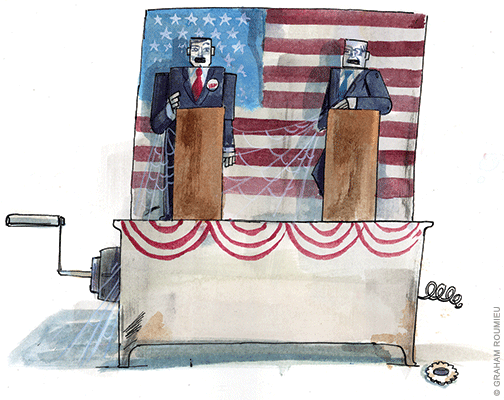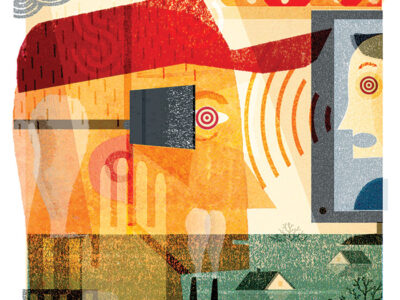
Not every presidential campaign debate produces a clear winner and loser, but in the 2012 series, pitting Barack Obama against Mitt Romney, there was little question about who turned in the most memorable performance: CNN anchor Candy Crowley. Famously fact-checking Romney on the fly and otherwise interjecting herself into a town-hall style debate whose rules explicitly forbade moderator commentary and follow-up questions, Crowley became the biggest story of the second debate.
The story of the third debate, moderated by CBS anchor Bob Schieffer, was that a 90-minute session specifically devoted to foreign policy featured not a single question about Africa, Russia, Europe, South or Central America, or global climate change.
Perhaps it is no wonder, then, that only 38 percent of US households tuned in—compared with 60 percent for the Kennedy-Nixon debates in 1960—and that fewer than half of those viewers watched any one debate in its entirety. Young voters, furthermore, were the most likely to give the debates a miss.
In July, the Annenberg Public Policy Center (APPC) published a report aimed at bucking those troubling trends. Democratizing the Debates, produced by a bipartisan group of 15 veteran presidential-campaign officials convened by APPC Director Kathleen Hall Jamieson, lays out a case—and a blueprint—for a quite different approach to the debates. Out with live audiences, “spin alleys,” and the TV-anchor monopoly on the moderator chair. In with direct candidate sparring, complete with “challenge flags” to enable them to deviate from rules that would otherwise preclude a response to an attack, or even a “chess clock” to allow candidates to manage their own time almost entirely as they see fit.
“I think all candidates are frustrated by the idea that they are supposed to fit discussions around healthcare or foreign policy or overall economic strategy into neat little boxes,” says panel co-chair Anita Dunn, a former White House communications director and senior advisor to Obama’s presidential campaigns. “Most candidates I’ve worked with, at every level, feel they deserve a more complex and layered discussion of what are really tough issues.”
The report laments the calcification of the debates into two-minute answer blocks favoring canned sound bites—not only for being a far cry from the celebrated Kennedy-Nixon debates, but for being out-of-step with the 21st-century media landscape.
“When the Republican and Democratic political parties formed the Commission on Presidential Debates in 1988,” the report notes, “there was no Internet or vote by mail, and ‘early’ voting was primarily absentee balloting with significant restrictions.” There was also “no Fox News, no MSNBC, no Univision, or money spent by the campaigns on cable advertising (and no digital on which to spend).”
And yet the debates haven’t meaningfully changed since 1992, when the single-moderator and town-hall formats were introduced.
“Very few ‘television programs’ have succeeded with a format that is more than two decades old,” the report observes. Indeed, the very idea that the debates remain primarily a television event is beginning to look pretty quaint, against the backdrop of instant Twitter commentary and widespread video-sharing on social media.
The presidential debates have no shortage of critics.
“They’ve become a little too talking-pointy, much like a press-conference or a Sunday interview show with two people sitting on the set,” says panel member Ben Ginsberg C’74 [“The Commissioners,” May|June 2014], who represented both Mitt Romney and George W. Bush before the Commission on Presidential Debates and in negotiations with their opponents on debate rules.
Some observers knock the debates for failing to influence voter decisions. Others lament that many of the most memorable moments—or at least the ones trumpeted most by the press—often have nothing whatsoever to do with policy: George H. W. Bush looking at his watch, for example, or Al Gore sighing.
Jamieson, the Elizabeth Ware Packard Professor of Communication at the Annenberg School and author of Presidential Debates: The Challenge of Creating an Informed Electorate, acknowledges that debates usually don’t influence the outcome of elections. Research indicates that whatever effect they have is “on the margin,” she says.
“So you can argue that the instances where they may have done that, the election was very close, so that swinging a small number of votes would matter.” But influencing election results isn’t really the point of the debates, she says.
“The debates’ goal is to increase the likelihood that voters see the relationship between voting and governance, and campaigning and governance. So if you ask what debates accomplish by way of learning, the answer is clear: They produce more accurate distinctions between candidates, and they produce a clear sense of what the eventual winner is going to do—even if you don’t support the eventual winner.”
As the media landscape has fractured and campaigns have become increasingly sophisticated at caricaturing opposing candidates, that’s an increasingly valuable aspect of the debates, Jamieson argues.
“Approximately half of those who vote aren’t going to see the person they voted for in the White House. And you’d like for the debate to, first, increase the perception that they have an accurate idea of what this person will do—whether they like it or not. But secondly, to show that this is not a complete fool who is the caricature of the opponent’s advertising. One of the reasons that the candidate who is lesser-known and has been more vilified in advertising tends to gain from the first debate is precisely that debates reduce the caricatured perception. So that function in itself is important.”
In fact, debates can offer a rare opportunity for voters to discern areas of agreement between candidates—which rarely emerge in other arenas of campaigning, but can end up being as important as their differences, Jamieson contends, because “the similarities forecast governance”—especially when control of Congress is divided between the parties.
“We saw this in 1996,” she says. “In the ’96 debate, a very significant moment occurred when Clinton adopted one of Dole’s positions: that if you’re selling a primary residence that you held for at least three years, you have the first $500,000 of capital gains exempted from tax. Dole had held that position, and was starting to gain some traction. Clinton adopted it in the debate. Well, if you were selling a house that year, the single most important thing you learned from the debate was that you should wait a year—take your house off the market. And the next year, the Republicans and Democrats agreed, and Clinton signed that exemption, which is currently the law.”
The worst aspects of contemporary debates, in the report’s estimation, are all the things that get in the candidates’ way.
The APPC commissioned polls, focus groups, and Nielsen-ratings analyses to guide the panel’s work. One key take-away: “The single largest criticism of the debates centers on the inability of moderators to do their job,” be it on account of a perceived bias, an inability to hold candidates to the rules, or because the “debates can take on the appearance of marketing opportunities for the network whose reporter or anchor is moderating.”
The report recommends curtailing the moderator’s role, and expanding the pool of potential moderators to include “university presidents, retired judges, historians, and others with demonstrated credibility.”
One of the most interesting recommendations is to employ a “chess clock” and allot each candidate a set amount of overall time, giving him or her the ability to decide when to drill deep on a topic, when to be brief, and when to challenge an opponent’s statements. In that format—which has been used in France—a candidate would have only him or herself to blame for a poor performance.
Asked how she would have advised Obama, if such a format been on the table in 2008 or 2012, Dunn answers, “The chess-clock format would allow candidates a lot more leeway to bring up the things that they actually think are really important … I think that had Mitt Romney and Barack Obama chosen the topics, there would have been a little more global discussion in the foreign policy debate, for example.
“But this was not a project that was designed to protect candidates,” she adds. “It was a project designed to really improve the experience for the candidates and the voting public.”
The panel also recommended overhauling the way debates are filmed and distributed, calling for debate organizers to provide “unimpeded access to an unedited feed from each of the cameras” in order to “facilitate creative use of debate content by social-media platforms as well as by major networks.”
“Right now, you hand people a branded debate that’s already edited,” Jamieson says. “And what that means is, if I’m on a mobile platform—and that’s increasingly where our young population is—it’s an awfully static, pre-selected environment. Maybe I want to keep the camera on both candidates simultaneously, on a split screen. Maybe I want to run Twitter on a third stream. And on a fourth stream I want everything that’s happening with the fact-checkers.”
“The idea is, we have to deliver the content in a way the audience is ready to receive,” she continues. “And if increasingly our audience is going to be multi-streaming and multi-tasking—and we’re still in this old passive-media model—that’s boring to this world. We’re saying that it should be set up so that it can look any way you want it to look, that you as a media platform think you can get people to watch. Then let the market decide what’s working and what’s not. I mean, somebody’s going to get lots of viewers, and somebody’s not, and there may be a platform that we didn’t envision that does something really wonderful that nobody could have anticipated.”
In other words, if Univision wants to run the debate with live translations, and MSNBC wants to run it as a split-screen, and some web-based stream-caster wants to run FactCheck.org’s Twitter feed as a ticker along the bottom, a diverse electorate will benefit from a diversity of formats.
“Why should we lock down and say, it’s going to be only this way?” Jamieson asks. “The old model will still be there. The networks will edit and screen—and if someone my age is most comfortable that way, terrific! You don’t want to close them out, either.”
Democratizing the Debates also mulls changes regarding thresholds for participation by independent candidates, scheduling the debates to account for the rising popularity of early voting, and expanding the role of the public in submitting questions, among other things. The full report can be found at annenbergpublicpolicycenter.org/democratizing-the-debates.
Though debates have been a mainstay of presidential elections for a generation, there is no guarantee that they will continue to be. Indeed, after the 1960 Kennedy-Nixon debates, it took 16 years before two candidates agreed to debate again. Aspiring and incumbent presidents remain free to spurn the Commission on Presidential Debates—a fact that some panel members hope will motivate it to adopt reforms.
“The commission could adopt this whole thing wholesale,” Jamieson says. “We think that would be terrific. But some other independent group—maybe social-media groups, maybe the people who run platforms—could say, ‘We’re going to do this.’ The question is, where will the candidates go?”
And will viewers follow them?
“I think that debates are baked into the political scene now, and will always take place,” says Ginsberg. “I think what’s in danger is viewership of them, and voter engagement.”
“I think the entire group was worried about whether debates would continue,” Dunn says, “and whether candidates would continue to see them as valuable opportunities to communicate with people, given where they’re going, and if they don’t evolve to catch up with the rest of campaign technology and communications. And because of that, we wanted to see, can we find a way to improve this process so that it remains something that candidates feel is critical to do, and that voters feel is important and informative to them in making their decisions.” —T.P.




